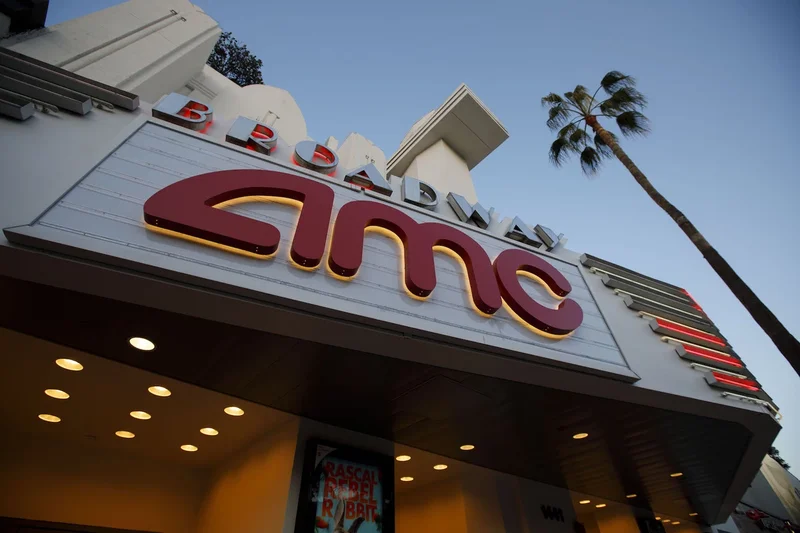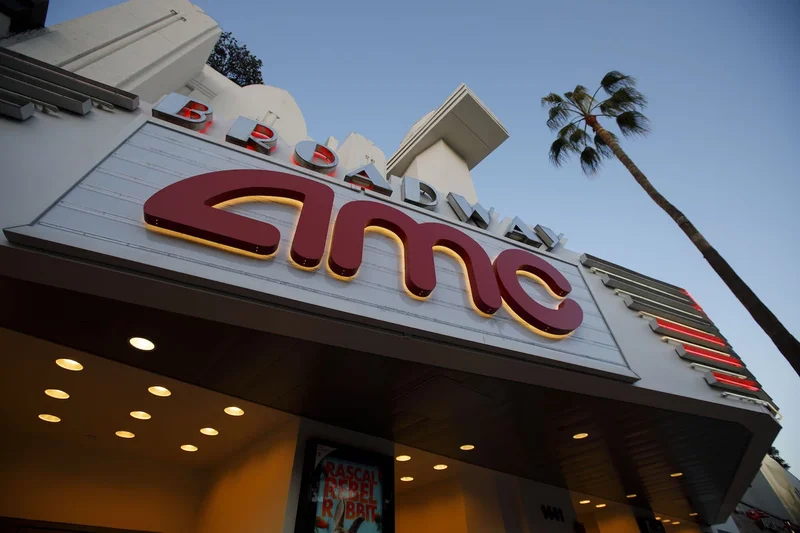Article Directory
Let's be real for a second. Is anyone at AMC Theatres actually in charge, or are they just letting a Magic 8-Ball make their business decisions? Because looking at their strategy lately, it feels less like a corporate turnaround and more like a frantic, caffeine-fueled brainstorming session where every bad idea gets a green light.
You’ve got a record-shattering Taylor Swift event, Strange Things Are Happening Between Netflix and Movie Theaters, mystery horror movie nights, and a goddamn DeLorean popcorn bucket. It’s a chaotic mess of nostalgia bait, fan service, and gimmickry. This isn't a strategy. This is just throwing spaghetti at the wall and praying something sticks.
And offcourse, one giant, glitter-covered noodle did stick. Hard.
The Swift Singularity
So, Taylor Swift broke the box office. Again. Her THE OFFICIAL RELEASE PARTY OF A SHOWGIRL cinematic event pulled in over $50 million globally in a single weekend. AMC’s CEO Adam Aron is out here taking a victory lap, thanking "the iconic Taylor Swift for bringing her brilliance and magic to movie theatres." Give me a break. AMC didn't mastermind this; they were just smart enough to rent out their buildings to the most powerful economic and cultural force on the planet.
Attributing this success to AMC's "vision" is like a parking lot owner taking credit for the Super Bowl's attendance. They just happened to own the asphalt where the party bus parked. I mean, the event got an A+ CinemaScore. You could have projected that thing onto the side of a barn and Swifties would have given it an A+.
The real question isn't why this worked. The question is, can they ever do it again? Is this a repeatable business model, or was it a once-in-a-generation lightning strike? Every other artist will now try to copy this, and I guarantee you not a single one will come close. This wasn't a win for the movie exhibtion industry; it was a win for Taylor Swift, who once again proved she can monetize anything, anywhere, anytime. AMC was just the venue. What happens when the next big thing isn't a concert film? What happens when it's just... movies again?

This one massive success feels less like a new beginning and more like a beautiful, distracting anomaly. It's the one piece of spaghetti that stuck perfectly, making the rest of the mess sliding down the wall look even sadder by comparison. And the rest of that mess is getting weird.
Desperate Times, Strange Bedfellows
Just when you thought things couldn't get stranger, AMC gets into bed with Netflix. Yes, that Netflix. The company that spent the better part of a decade trying to murder movie theaters is now using them to premiere the finale of Stranger Things. You can literally go to an AMC on New Year's Eve to watch something that's simultaneously debuting on the platform you're probably paying for at home.
This is a bad idea. No, 'bad' doesn't cover it—this is a five-alarm dumpster fire of strategic desperation. For years, the whole argument for theaters was the sanctity of the exclusive theatrical window. It was the one thing they had left. Now, they're chucking that out the window to become a glorified overflow room for a streaming service.
And why is Netflix even doing this? Their Chief Creative Officer was literally quoted dismissing the idea weeks ago, saying the show doesn't suffer from a "lack of conversation or community." So what changed? It tells me that even Netflix, the king of the algorithm, knows that watching the biggest finale of their biggest show on a 5-inch phone screen feels... pathetic. They need the big-screen spectacle to make their own content feel important. This isn't a partnership; it's two drowning companies clinging to each other for warmth. What's next, is AMC going to start hosting live podcasts? Staged readings of popular Reddit threads?
It all feels so disjointed. One week, it’s a premium concert experience. The next, it's a cheap gimmick like "Scream Unseen," where you pay $6 to watch a surprise R-rated horror flick. Then they pivot to selling you a plastic DeLorean that holds your popcorn. I’m sorry, but a light-up car ain't saving your business model. It’s just another distraction. It’s like a classic rock band that suddenly starts covering TikTok songs. The attempt to stay relevant is awkward, a little sad, and you just can't look away.
Then again, maybe I'm the crazy one here. People are buying this stuff. The theaters were packed for Swift. The popcorn buckets will sell out. Maybe this is what a movie theater is now: a chaotic, multi-purpose event space that occasionally shows films. But if that's the future, it sure feels like a downgrade. It feels like they've given up on the magic of cinema and settled for the hustle of just getting bodies through the door, no matter what it takes. And honestly...
It's a Hail Mary, Not a Game Plan
Let's stop pretending this is some brilliant, multi-pronged strategy for the future of cinema. It's not. It’s a desperate, panicked flailing. AMC isn't innovating; it's just saying "yes" to everything. A Taylor Swift concert? Yes. A Netflix finale? Sure. A plastic car from a 40-year-old movie? Why not. They’ve abandoned the core identity of being a movie theater and have become a venue-for-hire that also functions as a high-end vending machine. The movies themselves feel like an afterthought, a piece of legacy content they're stuck with. This isn't a bold new era; it's the chaotic final act before the credits roll.

